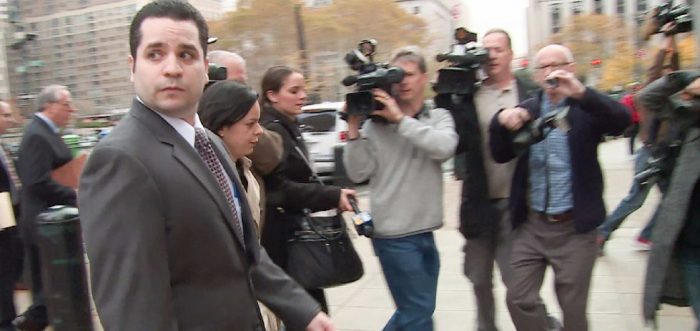How do we define the point at which a deviant fantasy becomes a crime? What is the gap between thought and action? Thought Crimes: The Case of the Cannibal Cop is a trip down the rabbit-hole of these complex questions that revisits the 2012 case of Gilberto Valle – a New York City cop who was charged with conspiracy to kidnap, murder and eat a number of women he knew personally, including his wife. The charges were based on evidence of Valle’s web-based discussions with fellow users on various fetish websites yet there was no evidence that Valle had ever acted on his urges, and the tangibility of his plans to abduct or harm anyone were debatable. This is where the film comes in: providing a meditative and slow-burning look at the blurry line between thought crime and legitimate criminal conspiracy.
First time director Erin Lee Carr constructs a considered inside look into Valle and his fantasies through the cooperation of Valle himself and his parents, who provide interviews and allow themselves to be filmed in their homes during various stages of the trial. This footage is interspersed with excerpts from Valle’s confronting and extremely vivid chat logs. Dissecting these logs and weighing in on how likely it was that Valle would have acted on his fantasies are various talking heads – psychiatrists, counsellors, academics, even one of the jurors in his initial trial – that contribute to the already-muddled understanding of Valle’s dangerousness. Not content with merely scrutinising the presentation of its subject, Thought Crimes goes even further and grapples with the legal and moral implications of Valle’s charges. Examining the evidence and featuring interviews with legal experts from the likes of Harvard and Stanford, the film becomes less interested in outing its subject as a spectacle than capturing the thought-police issues raised by the case.
It’s hard to resist comparing Thought Crimes in some part to The Jinx, the 2015 miniseries that examined the life of and also heavily featured the wealthy recluse Robert Durst, who was the key suspect in a series of murders at the time of filming. Of course, there are key differences between The Jinx and Thought Crimes: there is little question as to whether Valle actually hurt anybody, and this was much more ambiguous in the case of Durst. Thought Crimes is more interested in assessing Valle’s potential for crime, whereas The Jinx attempted to determine the guilt or innocence of Durst. Yet both rely heavily on input from their controversial subjects, and where The Jinx succeeds in showcasing the bizarre and contradictory nature of Durst by pressing him hard on sensitive topics, Thought Crimes is much more content to sit back and take Valle at face value – to its detriment. Certainly, the film becomes more authoritative on the harmful potential of Valle’s fantasies in the third act, espousing the “not everything that happens online is fantasy” line firmly and it is definitely fascinating to see Valle in such a low-key environment (footage of him cooking dinner and making jokes about wielding cutlery are laid on pretty thick), but the film and its subject matter beg for a firmer handling or interrogation.
The lack of a deeper probing of Valle and his take on the case had the resultant effect of leaving Thought Crimes somewhat unexceptional. The film certainly provided an interesting meditation on the blurry legal and moral space that Valle’s actions occupied, and subtly expanded this into a musing on the nature of thought crime without a sense of ham-fistedness that feels too easy to fall into when the word ‘Orwellian’ comes into play. The visual representations of the evidence – chat logs, Valle’s kidnap blueprints – were rather bland and seem to represent the wider disappointment of Thought Crimes and its seemingly stubborn avoidance of ascribing its own sense of drama or interrogation into the case. Thematically, the film is intriguing, but Thought Crimes seems hesitant to go beyond the safe space it firmly occupies.
Around the Staff:
| Felix Hubble | |
| Dominic Barlow |

